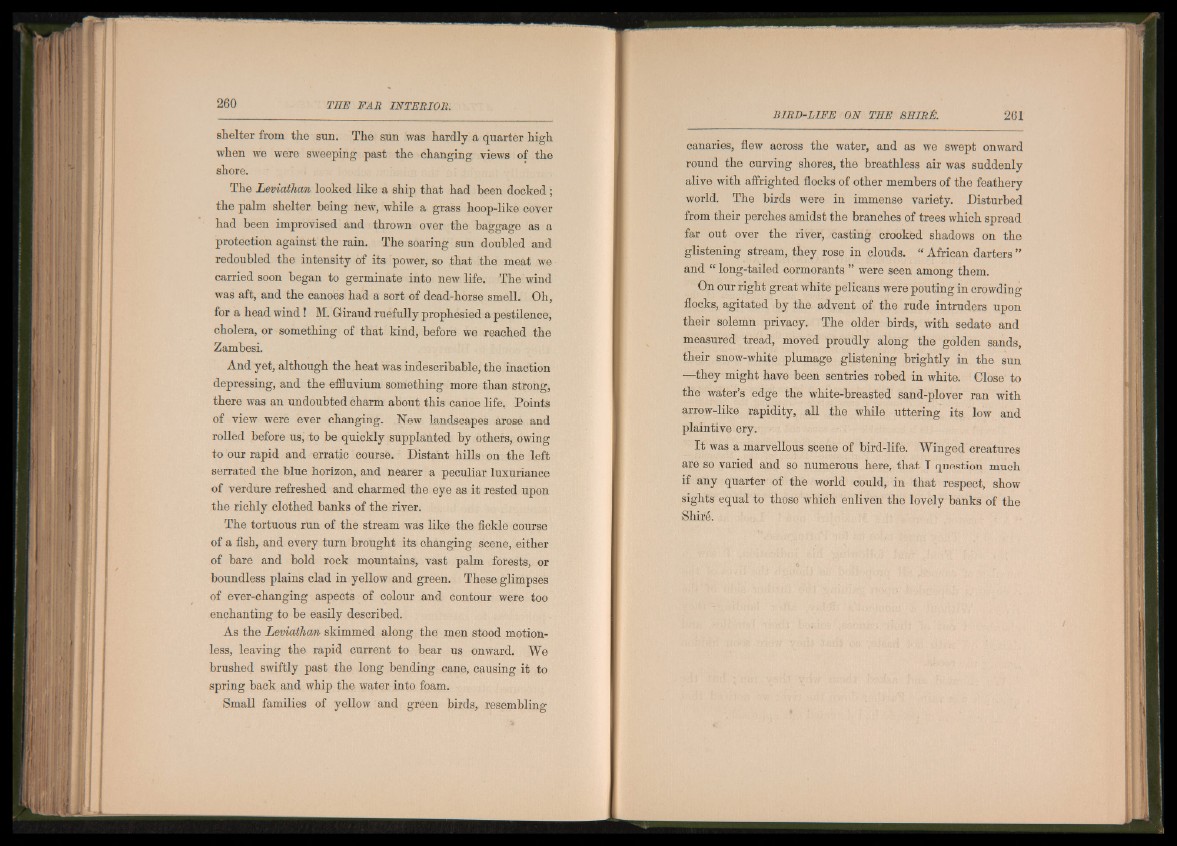
shelter from the sun. The sun was hardly a quarter high
when we were sweeping past the changing views of the
shore.
The Leviathan looked like a ship that had been docked;
the palm shelter being new, while a grass hoop-like cover
had been improvised and thrown over the baggage as a
protection against the rain. The soaring sun doubled and
redoubled the intensity of its power, so that the meat we
carried soon began to germinate into new life. The wind
was aft, and the canoes had a sort of dead-horse smell. Oh,
for a head wind! M. G-iraud ruefully prophesied a pestilence,
cholera, or something of that kind, before we reached the
Zambesi.
And yet, although the heat was indescribable, the inaction
depressing, and the effluvium something more than strong,
there was an undoubted charm about this canoe life. Points
of view were ever changing. New landscapes arose and
rolled before us, to be quickly supplanted by others, owing
to our rapid and erratic course. Distant hills on the left
serrated the blue horizon, and nearer a peculiar luxuriance
of verdure refreshed and charmed the eye as it rested upon
the richly clothed banks of the river.
The tortuous run of the stream was like the fickle course
of a fish, and every turn brought its changing scene, either
of bare and bold rock mountains, vast palm forests, or
boundless plains clad in yellow and green. These glimpses
of ever-changing aspects of colour and contour were too
enchanting to be easily described.
As the Leviathan skimmed along the men stood motionless,
leaving the rapid current to bear us onward. We
brushed swiftly past the long bending cane, causing it to
spring back and whip the water into foam.
Small families of yellow and green birds, resembling
canaries, flew across the water, and as we swept onward
round the curving shores, the breathless air was suddenly
alive with affrighted flocks of other members of the feathery
world. The birds were in immense variety. Disturbed
from their perches amidst the branches of trees which spread
far out over the river, casting crooked shadows on the
glistening stream, they rose in clouds. “ African darters ”
and “ long-tailed cormorants ” were seen among them.
On our right great white pelicans were pouting in crowding
flocks, agitated by the advent of the rude intruders upon
their solemn privacy. The older birds, with sedate and
measured tread, moved proudly along the golden sands,
their snow-white plumage glistening brightly in the sun
—they might have been sentries robed in white. Close to
the water’s edge the white-breasted sand-plover ran with
arrow-like rapidity, all the while uttering its low and
plaintive cry.
I t was a marvellous scene of bird-life. Winged creatures
are so varied and so numerous here, that I question much
if any quarter of the world could, in that respect, show
sights equal to those which enliven the lovely banks of the
Shire.